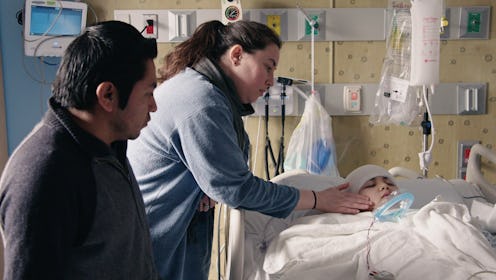Life
We Asked Doctors About Whether ‘Diagnosis’ Was Accurate — Here’s What They Said

It's a patient's worst nightmare: symptoms that physicians and experts can't explain. Now the Netflix series Diagnosis, inspired by the New York Times column of the same name, follows cases in which rare illnesses are diagnosed not solely by medical experts, but by crowd-sourcing: using audiences worldwide to search for somebody, anybody, who might recognize and identify a patient's condition. The program's head physician, Dr. Lisa Sanders, previously told Bustle, "It’s clear from some of the earliest research that’s been done on diagnosis that the person or doctor most likely to get the right answer is the person or doctor who has seen something before." But is crowd-sourcing diagnoses really an effective method of helping people with rare conditions?
Experts tell Bustle the answer is, often, yes. "Crowd-sourcing is a powerful way to aid in diagnosis (and research toward treatment) for rare conditions," Professor Matthew Might, the director of the Hugh Kaul Precision Medicine Institute at the University of Alabama, tells Bustle. And it's actually not that different from what happens in diagnostic units around the world, particularly in very complex areas of medicine where answers aren't immediately obvious.
"We do this clinically in large academic medical centers, as well as in medical school during training, where we present cases and discuss them as a group," Dr. Santosh Kesari, MD, a neuro-oncologist and chair of the Department of Translational Neurosciences and Neurotherapeutics at the John Wayne Cancer Institute at Providence Saint John's Health Center, tells Bustle. "This is the process of education for new doctors, but is also very valuable in the day-to-day care of complex patients in areas such as oncology and neurosciences."
Programs like Diagnosis may present the most dramatic of the cases available, but for many doctors, reaching out to other experts is part of their job. "I’ve had physicians reach out to me regarding multiple patients that have been in the media," Dr. Michael Lewis MD, medical director of the pediatric cystic fibrosis program at the University of Kansas, tells Bustle. "At a minimum, it's helpful for thinking about other illnesses that could be ruled out. Also, it has provided me with some physicians that I have never met in person." This is also the basis for the doctors-only consulting platform Medscape Consult, which connects physicians worldwide to communicate about cases; a review of the platform in 2018 found that it was used by 37,000 physicians from every continent.
However, the concept of Diagnosis goes beyond contacting other specific doctors for answers; it casts a far wider net, in hope of finding anybody, including civilians, who might provide valuable clues. The responses, Dr. Sanders told Bustle in her interview, could be an onslaught of information, and valuable time is used in sifting through for possible gems or insights. It's the non-medical element that concerns some doctors. "Crowdsourcing may help to get to a diagnosis faster," Dr. Kesari tells Bustle. "However, there is no guarantee compared to seeing a dedicated expert in the area of concern."
Other crowd-sourcing diagnostic platforms can give insight into this issue. The organization CrowdMed crowd-sources diagnosis using a network of "medical detectives," including physicians, healthcare practitioners and other people, some of whom aren't medically trained. A review of CrowdMed's efficacy in 2016 noted that while CrowdMed has cracked various cases, a large proportion of the medical detectives don't have medical degrees, and their ability to give diagnoses could be an issue of legal concern.
The other issue with crowd-sourcing is patient confidentiality, which is particularly important for vulnerable patients and children. Having your problems broadcast might lead to privacy issues, even if you give your consent and hope for the best result. "Privacy is a major issue to consider with this approach, of course, although there are steps that can be taken to safeguard privacy without losing much efficacy," Might tells Bustle. All the patients in Diagnosis have put their privacy on the line in order to try and find an answer, but other crowd-sourcing scenarios don't involve a full Netflix special, with its extreme exposure.
Overall, doctors are very positive about the idea of crowd-sourcing diagnoses to help people find long-sought answers for their medical issues. Many minds and perspectives can be far better than one. However, they warn against relying on opinions that might not be founded on medical science — and advise against taking any medical show on TV as gospel.
This article was originally published on